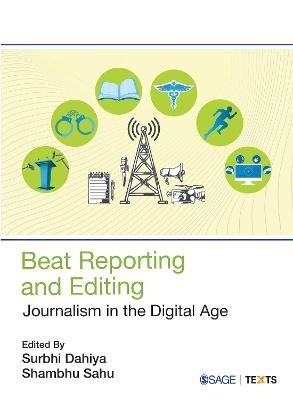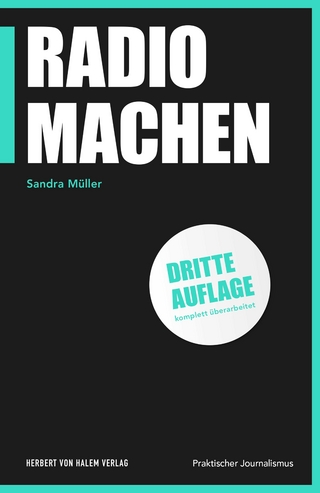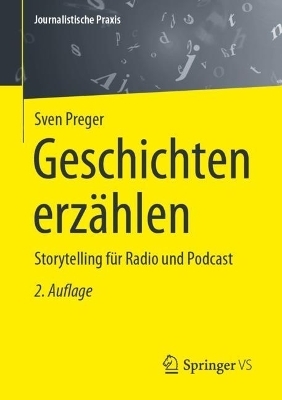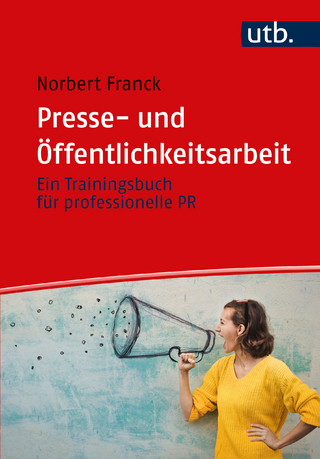
Beat Reporting and Editing
Sage Publications India Pvt Ltd (Verlag)
978-93-5479-214-4 (ISBN)
- Keine Verlagsinformationen verfügbar
- Artikel merken
Beat Reporting and Editing: Journalism in the Digital Age offers an extensive and pioneering study of reporting for all the news beats, and news writing and editing. Besides having exclusive chapters on rural reporting, storytelling, photojournalism and cartooning, social media reporting, misinformation and fake news, and solution-based journalism, this coedited forty-eight-chapter textbook is an exhaustive resource filled with insights on traditional beats like defence, politics, court, crime, sports and entertainment. It covers all the emerging forms of journalism such as artificial intelligence (AI), blockchain and bots, podcast, mobile journalism (MOJO), drone journalism (DOJO) and data journalism in India.
The book is structured to guide the students and teachers on the techniques of reporting on specific beats in the digital environment, role of AI and digital technologies in newsgathering and reportage as well as issues of identity, data, research and analysis in new-age journalism. Drawing on an enormous range of examples, case studies and first-hand experiences of eminent journalists and media educators, it encourages students to critically engage with all forms of journalistic writing in the digital era.
Key Features:
• First-of-its-kind textbook to include extensive coverage of reporting, with special focus on beat reporting
• Not only limited to print media but also covers broadcast journalism as well as digital media
• Contains chapters by highly experienced journalists who have worked in their specific beats for decades, and academicians teaching the subject in the classroom
• One of the most future-ready textbooks on journalism featuring a whole section on innovations and emerging technologies in journalism
Surbhi Dahiya née Bhalla is presently working as a Professor and Course Director in the Department of English Journalism at Indian Institute of Mass Communication (IIMC) (under the Ministry of Information and Broadcasting, Government of India). She is the Faculty Ambassador for International Association for Media and Communication Research (IAMCR) in India. She is the former editor of the reputed journal, Communicator. She started her career as a correspondent with The Tribune 20 years ago and later shifted to academics. Dr Dahiya holds a PhD in media studies and a dual master’s degree. She has as an MSc in mass communication and technology and an MBA in human resources. She was a gold medallist during her graduation. Professor Dahiya was the SUSI Scholar from India for the Study of the U.S. Institutes in the year 2017. She studied journalism at Ohio University during that period and was also certified by the US State Department. She was elected as the Liaison Chair for Academia and Industry by the South Asian Communication Association (SACA) in Chicago, where she also participated in Association for Education in Journalism and Mass Communication Conference (2017). She was an invited delegate for a roundworkshop conducted by Economic and Social Research Council and Indian Council of Social Science Research on social media research held in January 2015 in London. She chaired a number of sessions and presented many research papers nationally and internationally. She was a UNESCO panellist on Safety of Journalists in Montreal, and paper presenter at International Association for Media and Communication Research (IAMCR) at Canada (July 2015), Asian Media Information and Communication Centre conference at American University in Dubai (June 2015), World Press Freedom Day at Helsinki, Finland (May 2016), Journalism Education at IAMCR, Leicester, UK (July 2016); ICA-SACA, Prague, Czech Republic (May 2018), and 5th World Journalism Education Congress held at Paris Dauphine University, Paris (July 2019). She compiled ‘Connecting Threads: A Compendium of Media Educators of India’. She also won many awards for excellence in the field of journalism education like Women Economic Forum (WEF) Award 2019 for ‘Iconic Woman’ as an Exceptional Leaders of Excellence, PRSI National Award and Lifestyle Journalistic TLJ Jury Awards among others. Dr Dahiya is writing extensively on Indian media organizations. She is the author of The House that ZEE Built and Indian Media Giants: Unveiling the Business Dynamics of Print Legacies (forthcoming). Shambhu Sahu is an Assistant Professor at Vivekanand School of Journalism and Mass Communication (VSJMC), Vivekananda Institute of Professional Studies (VIPS), New Delhi. Previously, he worked as a teaching associate at Indian Institute of Mass Communication (IIMC), New Delhi, and as a project manager at the Centre for Culture, Media and Governance, Jamia Millia Islamia, New Delhi. He has 15 years of experience in print journalism and book publishing. As a journalist, he has worked with The Times of India, The Indian Express and the Press Trust of India (PTI) and has done both reporting and editing. He has over 200+ byline articles in various national dailies. During his stint in book publishing, he has commissioned/edited over 200+ academic and trade titles for SAGE and Rupa Publications. He also has three research publications in a peer-reviewed journal and a monograph. He is an MPhil/PhD scholar at the Centre for Culture, Media and Governance, Jamia Millia Islamia, New Delhi. He qualified UCG-NET in 2018. He has an MA in mass communication from Guru Jambheshwar University of Science & Technology (GJUS&T), Haryana, PG Diploma in English Journalism from IIMC, Dhenkanal, Odisha, and BSc from Ramjas College, University of Delhi. He has also done certificate courses in film appreciation and radio jockeying.
Message from Hon’ble Vice-President of India, Shri M. Venkaiah Naidu
Foreword by Bill Hinchberger
Foreword by Devesh Kishore
Preface
Acknowledgements
SECTION I: UNDERSTANDING REPORTING
Fundamentals of Reporting - Surbhi Dahiya and Shambhu Sahu
Types of Reporting - Chandrani Banerjee
News Sources and Art of Gathering - V. S. Chandrasekar
Understanding Beats - Prabhjot Paul Singh
SECTION II. BEATS AS SPECIALIZED REPORTING
Crime Reporting - Jupinderjit Singh
Government and Political Reporting - Pramod Kumar Singh
Parliamentary Reporting - Ashok Tuteja
Legislative Reporting - Kanchan Vasdev
Legal and Court Reporting - J. Venkatesan
Defence Reporting - Ajay Banerjee
Internal Security Reporting - Namrata Biji Ahuja
International Affairs Reporting - Smita Sharma
Conflict and War Reporting - Rohit Gandhi
Economy and Finance Reporting - Manoj Kumar
Business Reporting - Shishir Sinha
Health Reporting - Aarti Dhar
Education Reporting - Urmi A. Goswami
Sports Reporting - Kulveen Trehan
Science and Technology Reporting - Manoj Kumar Patairiya
Nuclear and Space Reporting - Pallava Bagla
Environment Reporting - Vibha Sharma
Civil Administration, City and Mofussil Reporting - Rajeev Khanna
Development Reporting - Ankuran Dutta
Gender, Women and Child Reporting - Rinku Paul
Rural and Agriculture Reporting - Mayank Bhardwaj
Disaster Reporting - Vijay S. Satokar
Arts and Culture Reporting - Tanvi Akhauri
Fashion, Lifestyle and Entertainment Reporting - Sreemoyee Kundu
Railways and Roadways Reporting - Arun Kumar Das
Civil Aviation Reporting - Vinay Kumar
Automobile Reporting - Vikrant Singh
Travel and Food Reporting - Parul Mehra
SECTION III. DATA JOURNALISM AND VISUALIZATION
Data Journalism - Uma Shankar Pandey
Data Visualization - Geeta Kashyap
SECTION IV. JOURNALISM IN THE DIGITAL AGE: INNOVATION IN REPORTING AND EMERGING TECHNOLOGIES
Emerging Technologies: MoJo, Podcast, Bots and Blockchain - Rohit Gandhi
Drone Journalism (DoJo) - M. J. Augustine Vinoth and Varsha Kukreti
Social Media Reporting - Sangeeta Pranvendra
SECTION V. VISUAL APPROACH IN JOURNALISM
Photojournalism, Storytelling and Cartooning - Tabeenah Anjum Qureshi and Mrinal Kumar Chatterjee
SECTION VI. BEYOND REPORTING: OPINION AND OTHER FORMS OF WRITING
Writing Editorials - Sanjay Kapoor
Writing for Op-Ed page and Letters to the Editor - Martand Jha
Writing Special Articles and Middles - Ujjwala S. Barve and Jupinderjit Singh
Writing Features - Vichitra Sharma
Writing for Supplements - Pooja Rana
Writing Reviews - Bhawana Somaaya
SECTION VII. CHALLENGES AND SOLUTIONS IN JOURNALISM: MISINFORMATION, FAKE NEWS VERSUS ETHICS
Misinformation, Fake News and Data Verification - Umesh Arya
Ethics in Reporting - Sambit Pal
Solution-based Journalism - Pramod Kumar
SECTION VIII. UNDERSTANDING EDITING
Editing Concepts and Processes - Marydasan John
Index
| Erscheinungsdatum | 29.11.2021 |
|---|---|
| Verlagsort | New Delhi |
| Sprache | englisch |
| Maße | 184 x 241 mm |
| Gewicht | 1220 g |
| Themenwelt | Sozialwissenschaften ► Kommunikation / Medien ► Journalistik |
| Sozialwissenschaften ► Kommunikation / Medien ► Kommunikationswissenschaft | |
| ISBN-10 | 93-5479-214-6 / 9354792146 |
| ISBN-13 | 978-93-5479-214-4 / 9789354792144 |
| Zustand | Neuware |
| Haben Sie eine Frage zum Produkt? |
aus dem Bereich


